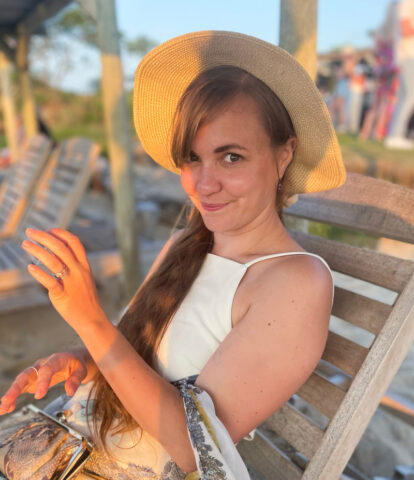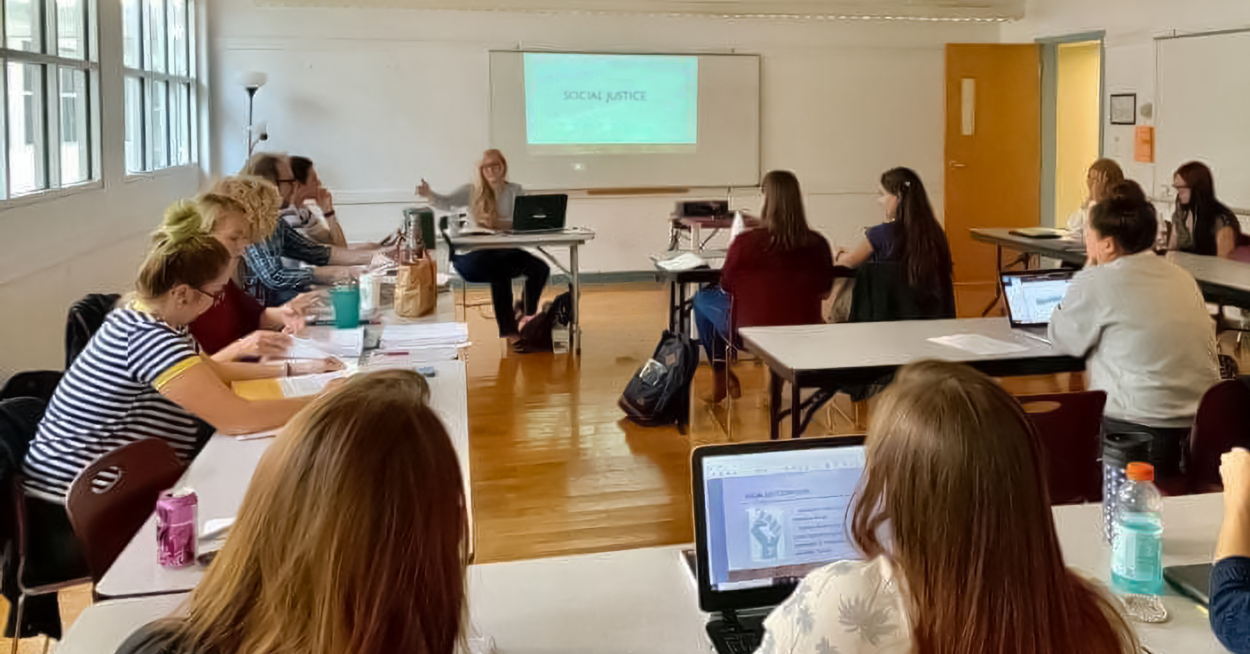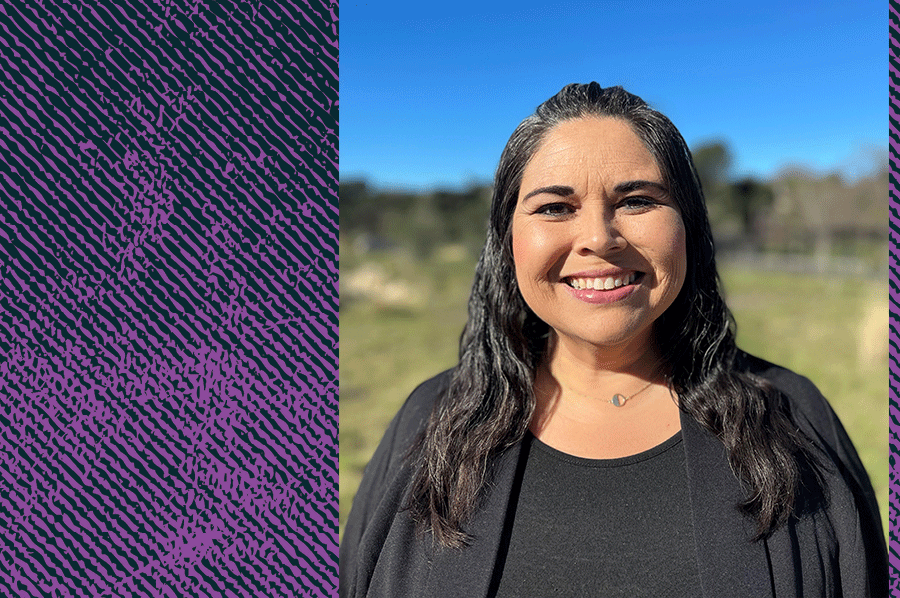Kate Evarts, PsyD, incorporates the principles of social justice into every aspect of her work. This is a practice she has carried from her time earning a PsyD in Clinical Psychology at Antioch’s New England campus all the way to today when she serves as Core Faculty and Director of Student Affairs in that same PsyD program. Working towards social justice is widely acknowledged to be important, but it can also be lonely and difficult to sustain. “It isn’t easy pushing against a system that was built to resist resistance,” explains Evarts. That’s exactly why she’s chosen to build and sustain community here at Antioch and beyond. As she says, “Doing social justice work in the context of relationships is one of the only ways to make it easier.”

Evarts’ enthusiasm and drive have made an impact on not only the campus and students but her colleagues as well. As Lorraine Mangione, a Professor of Clinical Psychology in the PsyD, says, “Evarts doesn’t just ‘talk the talk’ but really ‘walks the walk’ when it comes to infusing her work with social justice issues and a social justice framework.”
She does this in a myriad of roles: as an instructor in the courses she teaches; as the Psychology Department’s Director of Student Affairs; and as Director of the Center for Diversity and Social Justice, which she founded on the New England campus. This kind of tangible action and service aligns with Evarts’ philosophy. As she explains, “Many white people feel like they are already allies just because they don’t explicitly dislike people of color, when we also need to examine our implicit bias in a lifelong manner. Anyone who says they’ve ‘done the work’ isn’t doing anti-racist work.” Evarts embodies what it means to go beyond and make real, tangible contributions to building a more just society.
The Intersection of Feminism and Antiracism
A major focus of Evarts’ work is relationships—and, specifically, the therapeutic model known as Relational-Cultural Therapy. This modality grew out of the feminist movement and the work of Jean Baker Miller, a psychiatrist who took feminist and multicultural concepts and merged them. But it took some serendipity for Evarts to find it. “When I was a student in our PsyD program, there weren’t any courses or professors dedicated to this theory,” she explains. “But I discovered it while writing my qualifying exam. It felt like I had found a theoretical home.”
Shortly after discovering Relational-Cultural Therapy, Evarts found herself discussing her wider research project with her mother. That was when her mother told her that she had actually participated in some of the women’s focus groups at Wellesley College as an alum, which led to the development of Relational-Cultural Therapy. Evarts’ mother had later studied under Carol Gilligan, a collaborator of Jean Baker Miller. With this puzzle piece revealed, it made more sense why this modality’s focus on relationships aligned so closely with Evarts’ values.
Evarts especially appreciated the flexibility and expansiveness of the theorists and practitioners behind Relational-Cultural Therapy. RCT was originated by middle-class, straight, white women, but upon receiving criticism about their own blindspots and biases, they expanded their theory to incorporate voices of color, looking to the work of bell hooks and Patricia Hill Collins. This critique and development led to, among other changes, the theory being renamed from the Stone Center Model to Relational-Cultural Therapy.
Feminism has important values, says Evarts, but it also has a very white history. She believes that feminism alone is not enough of a framework to support social justice work, which is why any approach must include antiracism as a fundamental and necessary pillar. “As such,” says Evarts, “I’ve worked hard to engage in ongoing self-reflection, reflexivity, and critical consciousness, in the context of growth-fostering relationships to support a lifelong dedication to developing an anti-racist stance, critical for examining our country’s sociohistorical context and the ongoing oppression and marginalization that our clients, students, and colleagues of color face.”
The prominence of RCT at Antioch has grown by leaps and bounds since Evarts was a student. “When I was hired as an adjunct in 2017, I started lecturing about RCT in the first-year course on Interventions,” she says. For many of her students, it was just like it had been for her—it was the first time they had heard of this theory. But the key difference was that now they were learning about it in a first-year course. This has led to a big change. “Now many students identify as RCT clinicians,” says Evarts, who now teaches an advanced elective for fourth years specifically about RCT and points to fellow faculty like Rachel Chickerella as also incorporating RCT into their teaching. She thinks this is “due to its feminist and relational underpinnings being so attractive to many students.” She can’t help being a little proud of having, as she says, helped start “a movement towards a new community of RCT clinicians.”
Leading Students Toward Justice Work
Evarts loves how teaching can help students discover more about their own values and the way they want to move through the world. As she explains, “I would say that one of my proudest forms of feedback from students is when students tell me that I helped them ‘find their feminism.’”
Evarts is a licensed clinical psychologist, and she is committed to evidence-based practice. Each year she hires students to help with her research. Her research is focused on marginalized communities, especially those with marginalized sexual and gender identities. Her current focus is on youth with LGBTQ+ identities. Her intent is, she says, “to contribute to social change, whether through consciousness-raising, program developing, or making recommendations for policy, community, academic, or clinical change.”
This work expands outward through her work at the Center for Diversity and Social Justice, which Evarts founded and now directs. The Center serves as a home for PsyD students and faculty to work together, share knowledge, and organize as activists. The Center houses affinity groups around LGBTQ+ Visibility, Racial and Ethnic Equality, Sexual Violence Awareness, Disability Justice, and Reproductive Justice. The Center has a research collaborative where Evarts and her colleague Dean Hammer sponsor research focused on activism and advocacy, always emphasizing the importance of advocating with, rather than for, those who are oppressed and marginalized in our society. The Center also organizes events, fundraisers, film screenings, and letter-writing campaigns. Evarts and her colleagues aim to amplify the voices of students of color while aiding faculty as they integrate antiracist and decolonization values into their curriculum.
Directing the Center for Diversity and Social Justice has led to other opportunities to serve, including being a founding member of the University-wide Anti-Racist taskforce, where Evarts serves on the Employee Journey subcommittee. She has served as a leader of a diversity subcommittee in the organization of the biannual Student Success Symposium since its inception in 2021. In September of 2023, Evarts was one of 38 presenters at the Latinx Mental Health and Social Justice Symposium, which was held online so that community members from all of Antioch’s campuses could attend. She was asked by the symposium leaders to serve as the white ally presenter, sharing about strategies for developing co-conspiratorship and navigating difficult dialogues. “I definitely believe we need to keep discussing white allyship,” says Evarts. “It is very challenging for folks to embrace, and therefore challenge, their white fragility, for example, as it has come to be seen as a term that is as sensitive as ‘racist’.”
Finding a Professional Home at Antioch
As a psychologist focused on relationships, it’s no surprise that Evarts emphasizes the importance of her colleagues in being able to do her work. “Antioch allows me the collaborations and relationships that support and ground the work I do towards anti-racism and social justice,” she says. “I hope to continue working towards increased white allyship on campus, increased anti-racism for our staff, faculty, and students, and increased connection and community among us all.”
Evarts has been working in the field of psychology for the last decade, and she already has a strong body of work to show for these efforts. But in many ways, she’s just getting started. She has big plans for future research and activism. Most of all, she hopes others will keep joining her in working for a more just society. As she says, “I hope that others will embrace the importance of self-reflection in our lifelong journeys towards an anti-racist and just society.” And she hopes that others get something from her conviction that, as she puts it, “relationships are the key to working towards social and racial justice.”



